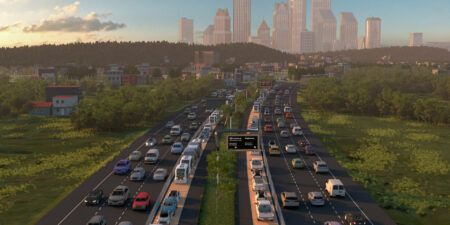Spanish automotive systems supplier Ficosa has been presenting its latest advanced vehicle communication solutions at the 2018 ITS World Congress in Copenhagen, including its range of antennas, smart connectivity modules, vehicle-to-everything (V2X) equipment, positioning systems, and cloud-based services.
Ficosa has been sharing a stand at the World Congress with its partner Panasonic, which features a simulation of the CityNow smart city technology ecosystem that the Japanese company is developing in Denver, Colorado (USA), with the participation of Ficosa. This is currently the world’s largest smart city demonstration project and it will be the first to deploy C-V2X (cellular vehicle-to-everything) technology in the USA.
One of the main attractions at the stand has been the company’s latest addition to its portfolio, the CarCom platform, a system that allows the integration of different connectivity solutions in a modular way. The CarCom technology platform enables vehicles to directly communicate with the new technologies that will define the future of mobility, such as Cellular-V2X, high-precision positioning, antennas with digital synchronization, and the platform will also be ready for the widespread introduction of 5G networks.
In recent years, Ficosa has concentrated its research and innovation efforts on advanced communications technology that will be used in the car of the future. The company has focused a large part of its work on developing antenna systems and telematics modules, which enable internal and external connectivity and are crucial for both connected cars and autonomous driving. Ficosa’s new solutions focus on safety and data protection, taking into account that the new CAV technologies will massively increase the amount of information coming from the vehicle and its surrounding infrastructure.
Ficosa’s antennas product range have also been a prominent feature on the stand, including the company’s new Flat Roof Antenna module, which is an innovative system that integrates multiple antennas into one unit, so they are not visible to the eye and without changing the vehicle’s aesthetics. Due to its flat shape that enables it to be built-in under the vehicle’s roof, the device offers several benefits, including a reduction of the number of individual antennas that need to be deployed, and the installation of just one module, which reduces assembly costs while increasing overall performance.
For the World Congress, Ficosa has released a digital catalog detailing its connectivity product families and variants, to show attendees the solutions that it is developing within the field of connected vehicle ecosystems.
The product variants on antennas, smart telematics, vehicle-to-everything solutions, precise positioning systems, and cloud-based services are detailed into the five product lines that the company is developing for the future widespread introduction of autonomous vehicles and smart city systems.




